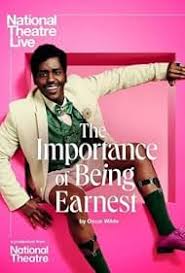
THE IMPORTANCE OF BEING EARNEST
UK, 2025, 179 minutes, Colour.
Ncuti Gatwa, Hugh Skinner, Sharon D.Clarke, Eliza Scanlon, Ronke Adekoluejo, Amanda Lawrence, Richard Cant, Julian Bleach.
Directed by Max Webster.
Once again, Oscar Wilde’s celebrated last play, from 1895.
In 1952, there was the straightforward basic staging as a drawing room comedy film, top English cast led by Michael Redgrave and Dame Edith Evans (and her still remembered classic outraged “handbag”!). It is frequently repeated for screenings on SBS World Movies and so readily available for audiences today.
There have been quite a number of filmed stage versions, even featuring David Suchet as Lady Bracknell.
There was also the 2001 version, very strong cast led by Colin Firth and Judi Dench as Lady Bracknell, but with something of an eye to modern tastes, even imagining Gwendolyn with a tattoo and the idea that Lady Bracknell began her career in the music hall. There were also some notable (inexplicably) omissions from the text.
Now here is the film version of the National Theatre’s 2025 production, complete text to delight those who have appreciated it for a long time. But the word definitely not to be used here is “straightforward”. This is not exactly a straightversion. Commentators on the play have referred to the “queer codes” inserted by Wilde, implicit references.
An unexpected opening sets the tone, Ncuti Gatwa (television’s Dr Who) in a pink gown, playing the piano, a Grieg Symphony, joined by the cast dancing around the piano. Then, stopping suddenly, the curtain opening – and we are back in 1895.
The opening is familiar, Jack visiting Algy, the conversation, Jack’s love for Gwendolyn, the imminent arrival of Lady Bracknell… And the mystery of Jack being Jack in the country and Earnest in the city and Algernon and his creation of his sick friend, Bunbury, whom he has to visit to comfort at a moment’s notice. Themes of deception, relationships. But, while Hugh Skinner as Jack gives an effective performance, he is quite overshadowed so often by Ncuti Gatwa, Jack almost playing straight man (the technical comedy term) to Algernon’s flamboyant domination of the friendship and the play.
It is apt to describe the production as camp in style, manner and mannerisms, but a great deal of posing, lots of postures, running and shuffling around the stage and a great deal of innuendo.
Every audience waits to see what Lady Bracknell is going to be like, a dominating presence, her articulation of opinions, her capacity for being shocked and astounded. Sharon D. Clarke certainly dominates this production – with “handbag” voiced in low, deep dismay. She controls the main two scenes in which she is present, both snobbish and exploitative when tempted by money and class.
Australian Eliza Scanlan is a forthright Sicily. Ronke Adekoluejo is an unexpectedly knowing Gwendolyn, hyperactive (sometimes irritatingly so) and extrovert in the innuendo in a very cheeky tone. Audiences will enjoy the performers playing Miss Prism, Canon Chasuble and the actor playing the two servants.
It is probably correct to say that Oscar Wilde would have enjoyed this particular interpretation of his play, making explicit the issues in his own life and relationships, but we also remember that this was his last play, the court case, his public humiliation, imprisonment and lonely death.